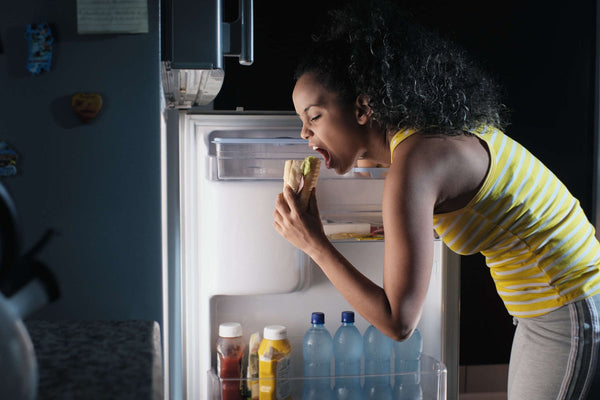You know sleep is important, yet a considerable portion of the population doesn’t get enough sleep (about 1 in every 3 adults based on current estimates).
With quality sleep, everything is better -- performance, focus, energy, mood, etc.
Conversely, chronic sleep deprivation is linked to a greater risk of developing:
- Diabetes
- Heart disease
- High blood pressure (hypertension)
- Stroke
- Obesity
Furthermore, sleep deprivation (even a single night) can disrupt hormone production (e.g. lower testosterone levels, higher cortisol levels), reduce mood & feelings of well-being, impair decision-making, and increase the likelihood of poor dietary choices (e.g. eating less healthy food and more junk food).
To top it off, not getting enough sleep can also cause you to burn less calories during the day and feel less satiated following a meal, thereby creating a recipe for disaster for sticking to your diet or completing your transformation challenge.
Let’s look a little closer today at how lack of sleep affects junk food cravings.
The Association Between Sleep Deprivation & Cravings
A growing body of evidence has found that sleep deprivation increases appetite and food intake.[1,2]
There are multiple mechanisms at play to help explain why we eat more food and crave junk food in particular when deprived of sleep.
For starters, sleep deprivation (even a single night) can decrease levels of leptin (the “satiety hormone”) and increase levels of ghrelin (the “hunger hormone).[1]
Additional research published in The Journal of Clinical Endocrinology & Metabolism found that sleep deprivation causes greater activation in certain regions of the brain in response to various food images.[3]
What’s more, the longer test subjects were deprived of sleep, the greater the reward response in anticipation of food.
Researchers noted that these changes can drive hedonic impulses to eat junk food and consume larger quantities than necessary. In other words, not getting enough sleep can lead us to seek out junk food and consume copious amounts of it in order to satisfy our craving for pleasure and satisfaction.
More recent studies have also found that our noses (olfactory senses) may play a role in why we crave junk food following a night of less-than-optimal sleep.[4]
In fact, certain smells can serve as powerful signals for the starting and stopping of eating.[5]
According to the study, when we’re sleep deprived, the olfactory system goes into overdrive to identify food. Additionally, alterations in how the olfactory system interfaces with the brain also take place, which drives the nose to be more attracted to higher calorie fare.[4]
Note: this may be a contributing factor to why the smell of bacon sizzling in the pan or a platter of cheese fries sounds better for breakfast than a bowl of oatmeal with a scoop of protein powder.
Furthermore, sleep deprivation is also found to be associated with greater snacking throughout the day, leading to individuals not only consuming more food, but higher-calorie foods as well.
Takeaway
The bottom line here is that getting enough sleep each night is paramount to your success in life, no matter if that’s in the classroom, the gym, the office, or during your transformation challenge.
Not getting enough sleep reduces your decision-making, hinders your performance in the gym as well as your motivation to exercise at all, negatively alters energy metabolism, increases hunger, decreases satiety, and much more.
If you need help getting enough sleep each night, try some of the following pointers:
- Go to bed at the same time every night
- Avoid/reduce blue light exposure at least 2 hours before bed
- Keep your room cool & dark
- Wear loose, breathable clothing
- Have good sheets, pillows, and mattress
- Read/meditate/journal/pray before bed
- Avoid caffeine and alcohol at least 3 hours before bed (longer if you’re particularly sensitive to caffeine)
You can also try a nighttime relaxation & recovery aid, such as RELAX, Recharge PM, or Beauty Dream PM to help reduce feelings of stress and anxiety and promote the sense of calm needed to create the ideal environment for deep, restorative sleep.
If, by chance, you do have a poor night’s sleep and want to help keep feelings of hunger or cravings at bay, you can also try 1UP Appetite Suppressant, which contains natural ingredients and fiber to help keep you on track with your nutrition plan and get the results you want!
References
- Spiegel K , Tasali E , Penev P , Van Cauter E 2004 Brief communication: Sleep curtailment in healthy young men is associated with decreased leptin levels, elevated ghrelin levels, and increased hunger and appetite. Ann Intern Med 141:846–850
- Nedeltcheva AV , Kilkus JM , Imperial J , Kasza K , Schoeller DA , Penev PD 2009 Sleep curtailment is anterior cingulate cortex accompanied by increased intake of calories from snacks. Am J Clin Nutr 89:126–133
- Christian Benedict, Samantha J. Brooks, Owen G. O'Daly, Markus S. Almèn, Arvid Morell, Karin Åberg, Malin Gingnell, Bernd Schultes, Manfred Hallschmid, Jan-Erik Broman, Elna-Marie Larsson, Helgi B. Schiöth, Acute Sleep Deprivation Enhances the Brain's Response to Hedonic Food Stimuli: An fMRI Study, The Journal of Clinical Endocrinology & Metabolism, Volume 97, Issue 3, 1 March 2012, Pages E443–E447, https://doi.org/10.1210/jc.2011-2759
- Surabhi Bhutani, James D Howard, Rachel Reynolds, Phyllis C Zee, Jay Gottfried, Thorsten Kahnt. (2019) Olfactory connectivity mediates sleep-dependent food choices in humans eLife 8:e49053.
- Saper CB, Chou TC, Elmquist JK. The need to feed: homeostatic and hedonic control of eating. Neuron. 2002 Oct 10;36(2):199-211. doi: 10.1016/s0896-6273(02)00969-8. PMID: 12383777.






